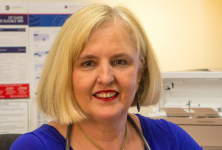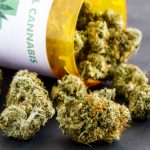Legalising the Inaccessible: An Interview with Medicinal Cannabis Advocate Dr Teresa Towpik

A medicinal cannabis bill that would make it easier for terminally ill patients to access imported cannabis medicines passed through the Senate on Thursday. However, it’s expected the Turnbull government will vote it down in the lower house.
This really isn’t surprising, as for some reason the federal government has been preventing terminally ill patients from accessing this medicine since late last year.
Australian Greens leader Richard Di Natale introduced the Medicinal Cannabis Legislation Amendment (Securing Patient Access) Bill 2017 in September. It’s designed to prevent the government from continuing to use a technicality to block fast access to these medicines for the dying.
Kafkaesque politicking
In November last year, former Australian health minister Sussan Ley prohibited terminally ill patients from accessing medicinal cannabis products via the Therapeutic Goods Administration’s (TGA) Special Access Scheme (SAS) category A pathway.
The SAS allows patients to import unapproved medicines into the country. Category A allows terminally ill patients faster access, as a doctor only needs to notify the TGA that their patient will be importing the products.
But, the federal government decided that when it comes to cannabis medicines specifically, the dying need to apply via the category B pathway. This means they must seek approval from the TGA, which a process that can take up to six months – time terminally ill patients may not have.
Senator Di Natale moved a disallowance motion through the Senate in June that reversed the prohibition and allowed the dying rapid access once more. However, in August, the government blocked this using importers’ contractual conditions to do so.
The Office of Drug Control sent out an email to importers stating that they would be in breach of their contracts if they provided the terminally ill access to the medicine via the category A pathway.
Legalising the inaccessible
This is the same government that passed legislation in February last year that allowed for the cultivation and manufacture of medical marijuana products. To date, only 18 licences have been issued: eight for cultivation and manufacture, five for research and five for manufacturing.
And even though the government established a scheme for importing medical cannabis into the country in February, the majority of the estimated 100,000 patients using these medicines around the country cannot get their hands on any legal product.
Under the TGA Authorised Prescriber Scheme, authorised medical practitioners can prescribe medicinal cannabis without further approval from the TGA. However, out of more than 111,000 registered medical practitioners in this country, there are only about 30 authorised to do so.
And all up, there’s only about 250 patients who are able to access legal cannabis medicines in Australia.
A general practitioner calling for a change
For your local GP who wants to prescribe these beneficial medicines, the mountains of paperwork are daunting.
In April, the South Australian government slashed red tape around the process. By August, only eight patients in that state had actually gained approval to use the drug.
Katoomba GP Teresa Towpik knows firsthand how frustrating the process of prescribing medicinal cannabis products actually is. The doctor is currently campaigning for authorities to streamline the prescription process.
Sydney Criminal Lawyers® spoke with Dr Towpik, founder of MediHuanna, about why cannabis is such a valuable medicine, the struggles doctors face when they want to prescribe it, and how she believes the process should actually work.
Firstly, Dr Towpik, you’ve been a general practitioner for over two decades now. Of late, you’ve been advocating for the use of medicinal cannabis. In your opinion, why is it such a beneficial medicine?
Cannabis has the ability through its molecules – cannabinoids, terpenes and flavonoids – to interact with multiple systems within our bodies. Especially, the very important physiological system called the endocannabinoid system, which was discovered in the 90s.
We have receptors in our body that cannabinoids from the cannabis plant can interact with. But, cannabinoids can interact with many other molecules as well.
It really is quite overwhelming. For many doctors, it’s difficult to embrace the idea, because we’ve been trained and conditioned into thinking that healing is based just on pharmaceutical agents, like single molecule synthetic agents.
And here we have a plant that has this ability to do so much. And our own endocannabinoid system, is involved in regulation of the majority of the physiological functions that happen in our body.
Part of embracing cannabis is actually educating ourselves and getting a better understanding of the science and molecules behind it. Because until now, we’ve been trained into thinking this is only a drug of addiction.
But just a few years ago, your ideas about cannabis were different. You were under the impression that it was a dangerous and addictive drug.
What changed your mind about medical marijuana?
The turning point was at the beginning of January last year. I wasn’t even interested in it. I hadn’t been following the news that it was going to be legalised. In fact, I’m the sort of person who doesn’t follow much news or read the paper anyway.
But, my son told me it was going to be legalised for medicinal use. And I thought, that’s really unusual. What medicinal use? I’d never heard about it. And I became curious.
Firstly, I went on Google. And one thing after the other. I went on YouTube. And I came across many stories of patients, sometimes amazing stories. And I really became very curious and interested. And one article after another, I realised I was actually dealing with a very important therapeutic agent.
To me the turning point was the education, once I started reading about it, and learning more and more. I’ve been reading something almost every day since January last year.
There is so much knowledge behind it. And so much happening now that I think it will eventually become a separate, specialty medicine because it is so huge.
Knowledge, awareness and reading. And then I became passionate about it. On top of that, the patients’ stories really influenced me that something needs to be done about it.
At the moment, doctors can prescribe cannabis medicines. But, the reality is very few patients can access them. You’ve been urging the government to create easier access.
What sort of process do you have to go through in order for your patients to be able to access any of these products?
Just for the sake of learning, I decided to test the process. Many patients had approached me. And I said, “OK. I’ll give it a go and see how it works.”
I applied for four patients. But, I had more asking. I really didn’t have time to go through it for other patients. I applied to the TGA. And it was rejected straightaway, because I didn’t have a letter of endorsement from a specialist. So, fair enough.
For two of them, eventually, I received the letter of endorsement. I will focus on one of them. This lady is almost 70. She suffers from lewy body dementia. Her family is very committed. They live in Tumut, which is about 400 kilometres from Katoomba. They approached me in the beginning of July.
Their specialist neurologist wasn’t even interested in supporting me. They said, “It doesn’t work. I don’t know much about it.”
But, eventually, we came across a neurologist in North Ryde, which was around the beginning of August. He was supportive. But, he was not willing to do any paper work or apply. He was OK to go as far as writing at the end of the letter that he was supporting the application for cannabis use.
We sent the submission again. The TGA approved that application overnight. I got excited. But, then because we were asking for a mixture of CBD and THC, which is schedule 8, we needed to apply to the NSW Health Ministry. So, we did.
They came back to me. First, I had to have an interview with one of the chief doctors. The interview was horrible. It felt like I was being interrogated. There was so many questions. Basically, I could feel that she was against it. And she was going to reject it. She tried to prove to me that it is dangerous.
A week later, I got the official response that the application was rejected, because the specialist needs to come out with a very detailed treatment plan.
I asked the specialist over a couple of emails. But, he didn’t respond. He was only prepared to go as far as providing his support, but no treatment plan or being involved.
Another thing they said was that I live too far from the patient – 400 kilometres away. But, the family is just so committed. They are willing to travel anywhere. They would come once a month at least. And we were in close contact on the telephone and Skype. So, I knew it could be managed.
These people have been asking for it since 2015, trying different channels and different ways. But, they just want to go legal. They don’t want to go to the black market.
This is the problem. On the one hand, the TGA approved it, but the state department rejected it.
It took me three months to go through that. And I supplied all the evidence, clinical justification and I went through as many published articles as possible. Which GP would have time to go through all that?
The policymakers and the people in power – the majority of them – and the majority of specialists are against it. The system is actually designed to fail. I’m confident to say that most of the time access is denied.
Making GPs ask specialists to support our applications is insulting. We can manage this wonderfully. We don’t really have to work like junior doctors under specialist supervision, like we don’t know what to do. That is insulting to doctors and cruel to patients.
What sort of alternative system for prescribing and accessing cannabis medicines are you advocating for Dr Towpik?
In Canada, doctors are actually allowed to prescribe. But, it’s not called a prescription. It’s like a legal document.
To start with, we should have unrestricted access to low THC/high CBD preparations. The other thing is that this medicine is very individual. You have to start low and go slow. So, you have to have access to different formulations. Because, everyone responds on different levels. That’s what doctors are doing in America and Canada.
Some people may need low THC/high CBD. Some may need higher THC. Some may just need CBD. But, to find out the right dose, we need to have access to the preparations.
Plus, our endocannabinoid system works on different levels. Some of us are more deficient, and some of us are less deficient. Again, very individual.
It has to be patient-centred, individual dosing and access to multiple preparations, which we know has to come from organic growers, and ethical manufactures. We need to ensure that we have access to high-grade medicinal cannabis.
It should be just a simple prescription. For example, THC 1 percent, CBD 20 percent. Then the patient could go to some kind of dispensary, or supplier.
From a doctor’s point of view, I shouldn’t have to do so much paperwork.
Right now, there’s a bill before parliament to reverse the prohibition on terminally ill patients accessing imported cannabis medicines in a prompt manner. But it doesn’t look likely to pass.
Why do you think the federal government is so set on blocking fast access to imported cannabis medicines for the terminally ill?
It appears that way. They are saying one thing and doing another thing. I don’t know what is going on behind the curtain. I just wonder what is going on.
You’re the founder of MediHuanna. Could you explain what the aim of this organisation is?
Basically, it’s just a small group. We were thinking last year that somehow we want to do something about it. We want to connect with other doctors. We want to spread education. And we wanted to work on patient access.
MediHuanna was established last year around October. What we are doing right now is mostly education.
We were hoping to help patients with access to medicinal cannabis. But, after what we have gone through, I know the current situation makes it basically impossible. And it takes too much time.
We are just about to launch a petition. We’re hoping other doctors will sign the petition to basically streamline the process of prescribing and make cannabis accessible and affordable to patients, so they don’t have to keep on breaking the law.
On top of that, I’ve just completed a book. It’s being edited. And I’m waiting for one of the scientists to make sure all the facts are correct.
It’s an Introduction to Medicinal Cannabis: An Easy Guide for Doctors and Patients. Why did I write it? Because when I started reading about it, I was missing a simple guide. Something that was not too complicated, but just highlights, with a bit of a history of molecules, medicals conditions and side effects.
It’s not just presenting the basic science. But, it’s about the lobbying side as well. We are also just about to launch very soon the first online learning course for doctors, patients and professionals.
At the moment, we are focusing on education. I keep on educating myself. And spreading my knowledge – whatever I know right now – to the world.
And lastly, over the last couple of years there’s been a lot of cannabis legislation passed. There have been federal laws allowing for the cultivation and manufacture of medicinal cannabis. There have been restrictions placed on accessing these same medicines. And provisions have been put in place to allow for their fast importation.
But regardless, hardly any patients can access any legally sanctioned product.
Do you think there will be progress anytime soon? Or will Australia be bogged down in red tape for another decade?
I’m very passionate about it. And I’m a great believer that it won’t be as long as ten years. Sometimes things happen in quantum leaps: nothing seems to be happening, and then all of a sudden, bang.
I’m quite optimistic even though it is difficult. But, what I really want to do is reach out to other doctors. If other doctors sign my petition, there will be quite a huge movement.
Doctors are generally quite conservative, and they don’t really want to stick their heads up. But, I hope they will sign the petition. Because I think there are a lot of GPs out there who are willing to prescribe. They just don’t know what to do, or where to go.
I don’t believe it’s going to be ten years. My gut feeling is three.
Dr Towpik thanks very much for taking the time out to speak with us today.
That’s very good.







